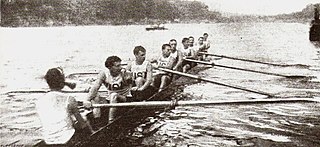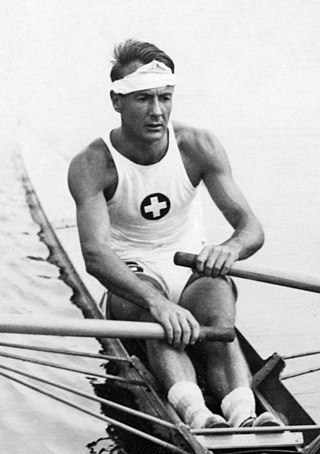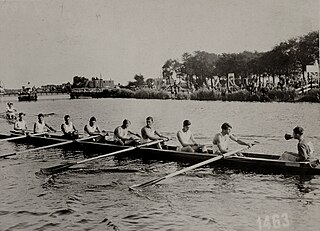
The men's coxed pair was one of the competitions in the Rowing at the 1900 Summer Olympics events in Paris. It was held on 25 August and 26 August 1900. 7 boats, involving 22 rowers from 3 nations, competed. The event was won by a mixed team; Minerva Amsterdam's Dutch crew replaced its coxswain with a local French boy for the final. François Brandt and Roelof Klein were the rowers, with Hermanus Brockmann the cox in the semifinals; the French cox is unknown. Second and third places both went to French boats; Société nautique de la Marne took silver while Rowing Club Castillon earned bronze.

The men's eight was one of the competitions in the Rowing at the 1900 Summer Olympics events in Paris. It was held on 25 and 26 August 1900. 5 boats, involving 46 rowers from 5 nations, competed. The event was won by the United States, represented by the Vesper Boat Club. Silver went to the Royal Club Nautique de Gand of Belgium, with bronze to Minerva Amsterdam from the Netherlands.

The men's coxed pair event was a rowing event conducted as part of the 1964 Summer Olympics programme. It was held from 11 to 15 October. There were 16 boats from 16 nations, with each nation limited to a single boat in the event. The event was won by American crew Edward Ferry, Conn Findlay, and coxswain Kent Mitchell. Findlay had been on the United States gold medal crew in 1956 and bronze medal crew in 1960; he was the first man to earn two gold medals in the event, as well as the first man to win three medals of any color in the event. Mitchell had also been on the 1960 crew, and was the seventh man to earn multiple medals in the coxed pair. Jacques Morel, Georges Morel, and cox Jean-Claude Darouy took silver to earn France's first medal in the event since 1952. Herman Rouwé, Erik Hartsuiker, Jan Just Bos earned what was formally the Netherlands' first medal in the event; a pair of Dutch rowers had won the first edition in 1900, but had jettisoned their cox in favor of a local French boy between rounds and thus that medal was a "mixed team" medal.

The men's single sculls was a rowing event held as part of the rowing programme at the 1904 Summer Olympics. It was the second time the event was held at the Olympics. The competition was held on Saturday, July 30, 1904. Four American rowers competed. Frank Greer won the event, with James Juvenal second and Constance Titus third. It was the only podium sweep in the history of the event, which restricted the number of boats per nation beginning in 1908.

The men's eight competition at the 1996 Summer Olympics in Atlanta, Georgia took place at Lake Lanier. It was held from 21 to 27 July. There were 10 boats from 10 nations, with each nation limited to a single boat in the event. The event was won by the Netherlands, the nation's first victory in the men's eight and first medal of any color in the event since 1900. Germany took silver; it was the 9th time in the past 10 Games that a German team was on the podium, with the only exception being 1984 when no German boats competed. Russia earned bronze in its independent debut.

The men's coxed four event was part of the rowing programme at the 1920 Summer Olympics. The competition was held on 28 and 29 August 1920. It was the third appearance of the event, which had previously been held inaugural rowing competitions in 1900 as well as in 1912. Eight boats, each from a different nation, competed. The medals all went to nations that had not won a medal in the men's coxed four previously: Switzerland and the United States took gold and silver, respectively, in their debuts in the event; Norway took bronze.

The men's eight event was part of the rowing programme at the 1920 Summer Olympics. The competition was held on 28 and 29 August 1920. It was the fifth appearance of the event. Eight boats, each from a different nation, competed. It was the first time that nations were limited to a single boat. The event was won by the United States in a final against Great Britain; the two nations had taken all four previous gold medals. Bronze went to Norway, the nation's first medal in the men's eight. In addition to gold medals, the winners received a challenge prize that had been donated by Eugenio Brunetta d'Usseaux before his death in 1919.

The men's coxed pair event was part of the rowing programme at the 1924 Summer Olympics. The competition, the third appearance of the event, was held from 14 to 17 July 1924 on the river Seine. Five teams, each from a different nation, competed, for a total of 15 rowers and coxswains. The event was won by Switzerland, with rowers Édouard Candeveau and Alfred Felber and coxswain Émile Lachapelle. The two Swiss rowers had earned bronze in 1920 with a different cox. Defending champion Italian rowers Ercole Olgeni and Giovanni Scatturin took silver, this time with Gino Sopracordevole as their cox. Candeveau, Felber, Olgeni, and Scatturin were the first four men with multiple medals in the event. The United States' debut in the event netted a bronze medal for rowers Leon Butler and Harold Wilson and cox Edward Jennings.

The men's eight event was part of the rowing programme at the 1924 Summer Olympics. The competition, the sixth appearance of the event, was held from 13 to 17 July 1924 on the river Seine. Ten teams, each from a different nation, competed. The event was won by the United States, the nation's second consecutive and fourth overall victory in the event. Canada took silver, its first medal in the men's eight since 1908. Italy, making its debut in the event, took bronze.

The men's eight event was part of the rowing programme at the 1928 Summer Olympics. It was one of seven rowing events for men and was the seventh appearance of the event, which had been on the programme for every Olympic Games since rowing was added in 1900. It was held from 2 to 10 August 1928. There were 11 boats from 11 nations, with each nation limited to a single boat in the event. The event was won by the United States, the third consecutive victory for the Americans in the event and fifth overall. Great Britain returned to the podium after a one-Games absence in 1924 broke a three-Games medal streak, taking silver this time. Defending silver medalists Canada took bronze.

The men's coxed pair competition at the 1972 Summer Olympics in Munich took place from 27 August to 2 September at the Olympic Regatta Course in Oberschleißheim. There were 21 boats from 21 nations, with each nation limited to a single boat in the event. The event was won by East German crew Wolfgang Gunkel, Jörg Lucke, and coxswain Klaus-Dieter Neubert; it was the first medal in the event for East Germany as a separate nation. Czechoslovakia (silver) and Romania (bronze) also won their first medals in the men's coxed pair.

The men's coxed pair competition at the 1932 Summer Olympics in Los Angeles took place are at Long Beach Marine Stadium on 13 August. Competition consisted of a single round. There were 4 boats from 4 nations, with each nation limited to a single boat in the event. The event was won by the United States, its first victory in the event. Coxswain Edward Jennings had also been on the bronze medal team in 1924, making him the fifth man with multiple medals in the coxed pair. The American rowers were Charles Kieffer and Joseph Schauers. Silver went to Poland, in its coxed pair debut. France earned bronze.
The men's eight competition at the 1932 Summer Olympics in Los Angeles took place at the Long Beach Marine Stadium. It was held from 10 to 13 August. There were 8 boats from 8 nations, with each nation limited to a single boat in the event. The event was won by the United States, the nation's fourth consecutive and sixth overall victory; the Americans had won every time they competed. Silver went to Italy, that nation's second medal in the men's eight after a bronze in 1924. Canada repeated as bronze medalists, stretching their podium streak in the event to three Games.

The men's eight competition at the 1948 Summer Olympics took place at Henley-on-Thames, near London. It was held from 5 to 9 August. There were 12 boats from 12 nations, with each nation limited to a single boat in the event. The event was won by the United States, the nation's sixth consecutive and eighth overall gold medal in the men's eight; the Americans had won every time they competed. Great Britain, the only other nation to have won in the event, finished second for its first medal in the event since 1928. Norway took bronze, its first medal in the men's eight since 1920.

The men's eight competition at the 1976 Summer Olympics took place at the rowing basin on Notre Dame Island in Montreal, Quebec, Canada. It was held from 18 to 25 July and was won by the team from East Germany. It was East Germany's first victory in the event, improving on a bronze medal in 1972. The defending champions, New Zealand, switched places with the East Germans, taking bronze in 1972. Between them was Great Britain, taking its first men's eight medal since 1948. There were 11 boats from 11 nations, with each nation limited to a single boat in the event.

The men's coxed four competition at the 1948 Summer Olympics in London took place at Henley-on-Thames, London. It was held from 5 to 9 August. There were 16 boats from 16 nations, with each nation limited to a single boat in the event. The event was won by the United States, the nation's first victory in the men's coxed four. Switzerland earned silver, the nation's fifth medal in the event in six Games. Denmark took its first medal in the men's coxed four since 1912, with bronze.

The men's coxed pair competition at the 1956 Summer Olympics took place at Lake Wendouree near Ballarat, Australia, from 23 to 27 November. There were 8 boats from 8 nations, with each nation limited to one boat in the event. The event was won by the American crew, rowers Arthur Ayrault and Conn Findlay and coxswain Kurt Seiffert. It was the first victory in the event for the United States since 1932 and second overall, matching Switzerland for most among nations at that point. The United Team of Germany took silver in its debut. The Soviet Union earned its first medal in the event, with Ihor Yemchuk, Heorhiy Zhylin, and Vladimir Petrov (cox) taking bronze.

The men's coxed pair competition at the 1960 Summer Olympics took place at took place at Lake Albano, Italy. It was held from 31 August to 3 September. There were 18 boats from 18 nations, with each nation limited to a single boat in the event. The three nations on the podium were the same as those in 1956, though in a different order. The event was won by the United Team of Germany, with Bernhard Knubel and Heinz Renneberg rowing with Klaus Zerta the coxswain. Zerta is the youngest confirmed male gold medalist in Olympic history at 13 years and 283 days, just beating Hans Bourquin by 9 days. The 1900 men's coxed pair gold-medal-winning coxswain may have been younger, but the identities and ages of most coxswains in that event, including the gold medalist, are not known. The Soviet Union, bronze in 1956, took silver this time with Antanas Bagdonavičius, Zigmas Jukna, and Igor Rudakov. Defending champions the United States took bronze; Conn Findlay was the only man from the 1956 podium to return, this time with Richard Draeger as his rowing partner and Kent Mitchell the coxswain.

The men's eight competition at the 1960 Summer Olympics took place at took place at Lake Albano, Italy. It was held from 31 August to 3 September. There were 14 boats from 14 nations, with each nation limited to a single boat in the event. The event was won by the United Team of Germany in that combined team's debut; it was the first medal for any German team since the 1936 Games in Berlin and first-ever gold medal in the event for a German team. Canada repeated as silver medalists. Czechoslovakia won its first men's eight medal with a bronze. The United States, which had won the last eight times the event was held and all ten times the nation had appeared before, lost for the first time—finishing fifth, off the podium entirely, despite being among the contenders once again.

The men's coxed pair competition at the 1968 Summer Olympics took place at Virgilio Uribe Rowing and Canoeing Course, in the Xochimilco borough of Mexico City. It was held from 13 to 19 October. There were 18 boats from 18 nations, with each nation limited to a single boat in the event. The event was won by the Italian crew, rowers Primo Baran and Renzo Sambo and coxswain Bruno Cipolla; it was Italy's first victory in the event since 1920 and second overall. The Netherlands made the podium for the second consecutive Games, though with an all-new team: Herman Suselbeek, Hadriaan van Nes, and cox Roderick Rijnders took silver. A Danish boat medaled in the event for the first time since 1952, with Jørn Krab, Harry Jørgensen, and Preben Krab earning bronze. The American medal streak of three Games ended with the United States boat placing fifth.



















